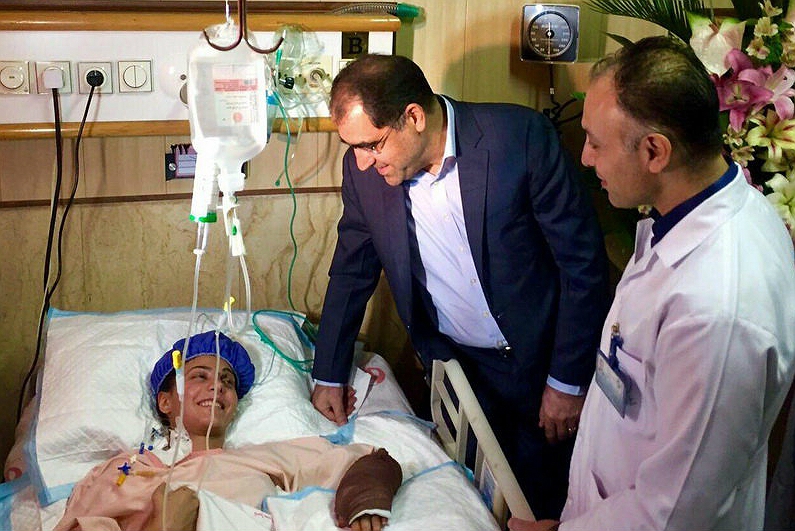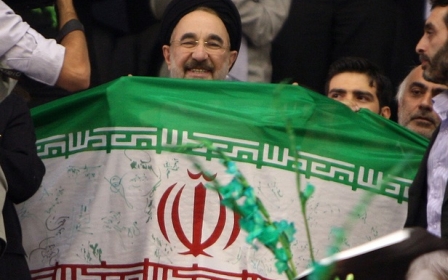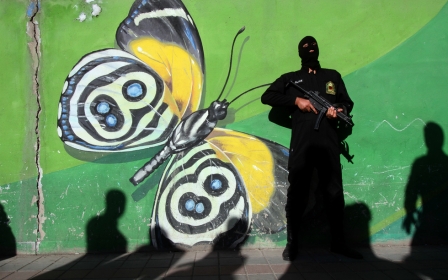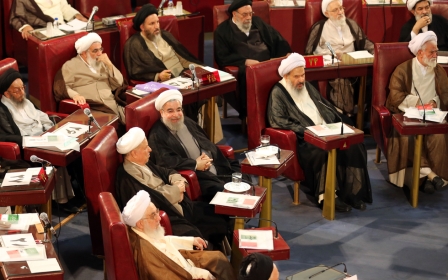Iranians rally around women's rugby player injured in car crash

TEHRAN - Sara Abdolmaleki was driving home to Tehran late on the evening of 20 January when the accident happened. A member of Iran’s national women’s rugby team, Abdolmaleki was tired after spending the day on a talent scouting mission to the western city of Kermanshah.
“My daughter was sleepy, it was night and she lost control,” Manizhe Aboutorabi, Sara’s mother, told Middle East Eye.
The car rolled several times before landing upside down, leaving the 22-year-old alive but seriously injured.
Abdolmaleki was taken to Tehran’s Asia Hospital where doctors said she would need surgery for a severe spinal cord injury if she were to walk again.
But for Abdolmaleki’s parents, the shock of seeing their daughter lying in a hospital bed was made worse by their fear that they would not be able to meet the cost of her medical care, with the family quoted a bill of 100 million Toman ($34,000) just for her initial operations.
Aboutorabi said the family felt hopeless and was preparing to sell everything they had.
“We couldn’t afford the expenses. We managed only to collect about 50 million Toman ($14,000) in the first days,” she said.
But help would come from an unlikely source.
Mehrab Qasemkhani is a scriptwriter in Iran, well known for comedy shows such as Pavarchin and films such as St. Petersburg. He also has more than 810,000 followers on Instagram.
Although not widely played or well-known in Iran, rugby has been growing in popularity since a national federation for the sport was established more than 10 years ago and one of Qasemkhani’s fans contacted him on Instagram to tell him about Abdolmaleki’s accident.
The case caught Qasemkhani’s attention. After swapping messages with the fan, he phoned Aboutorabi and then sent his wife, Shaghayegh Dehghan, a famous actress, to the hospital to ask about Abdolmaleki’s condition.
Qasemkhani then posted a photo of the injured rugby player on Instagram and shared details about her case with his followers.
“Her life depends on all of us. I ask you to be by her side,” he wrote.
One day later, Qasemkhani wrote that $7,000 had been collected and deposited into the family’s account.
On the second day, he wrote: “Do you know what have you done in a short time? You have deposited about 200 million Toman [$70,000] into Sara’s mother account. This means not only that the expenses of all of Sara’s surgeries will be covered, but that her post-hospital needs will also be met.”
The social media campaign also captured the public’s imagination, with notable artists, athletes and celebrities visiting her in hospital, with some donating generously towards her care.
In one case highlighted by Qasemkhani, a young man currently on military service with just $6 in his bank account donated 60 percent of his money to Abdolmaleki.
Among visitors to the hospital was Ali Daei, Iran’s most famous football player.
“Visiting Sara was my duty, and I will help her along with my friends,” a tearful Daei said following his visit to her bedside.
Meanwhile, Hassan Ghazizade Hashemi, Iran’s health minister, also paid Abdolmaleki a visit and ordered the hospital not to ask for any more money from her family.
Hashemi is the architect of Iran’s RouhaniCare, the popular healthcare scheme named after Iranian President Hassan Rouhani and modelled on US President Barack Obama’s Obamacare reforms which have slashed the cost of medical treatment for ordinary Iranians.
“Iranians are really emotional, that is why you find so many poets in this country,” Hossain Baher, a sociologist, told MEE. “This was a positive event, because a girl on the verge of dying came to life thanks to people’s help. But I think people should behave like this more often. For instance, homeless people in Tehran should receive such attention and care.”
Abdolmaleki, who has now left hospital and moved to a physiotherapy rehabilitation centre, has expressed her thanks to those who helped her and her family in a short video published online by Qasemkhani.
As of Tuesday, the video had been "liked" more than 47,000 times.
Ali Akbar Abdolmaleli, Abdolmaleki’s father, also told MEE that the family had been touched by the financial support and goodwill they had been shown and said he hoped his daughter would one day soon again be able to play the sport she loves.
Doctors say it could be 18 months before Abdolmaleki is able to walk onto a rugby field again. Whether she will ever recover enough to return to the international game remains to be seen.
“We never thought people would help us this much. Even Iranians living in other countries called us to help our girl. I’m getting a lump in my throat right now when I’m talking about the kindness of people,” he said.
“In the first hours after the accident we were told that the doctors believed she was dead, so we are thankful to God. Now we are hopeful that our daughter will get back on her feet and play rugby again.”
New MEE newsletter: Jerusalem Dispatch
Sign up to get the latest insights and analysis on Israel-Palestine, alongside Turkey Unpacked and other MEE newsletters
Middle East Eye delivers independent and unrivalled coverage and analysis of the Middle East, North Africa and beyond. To learn more about republishing this content and the associated fees, please fill out this form. More about MEE can be found here.




